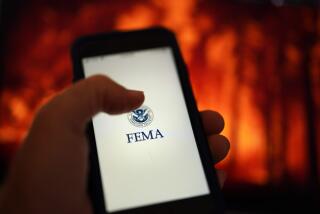Cellular, Cable-TV Giants to Test New Wireless Service
- Share via
Underscoring the intensifying battle for control of the U.S. phone system, the nation’s largest mobile phone operator and biggest cable TV operator said Wednesday that they are teaming up to test new personal communication services.
The partnership of McCaw Cellular and cable TV giant Tele-Communications Inc.--the first alliance between a major cellular operator and cable TV firm--is widely viewed as another sign of the escalating competition facing the seven Baby Bell regional telephone companies, which have held monopolies in their service territories until recently.
The latest telecommunications battleground involves the still-unproven but potentially lucrative market for personal communication services--go-anywhere, call-anywhere cellular-style networks employing pocket-sized, wireless phones.
Redmond, Wash.-based McCaw and Denver-based TCI said they will test interest among residential customers for a moderately priced wireless telephone system whose power and range will be greater than traditional cordless telephones but less than currently available cellular service. The test among 200 or so households is to begin in Medford, Ore., this year.
McCaw officials said the experiment will link a new, low-power cellular network to its existing cellular network over TCI’s fiber-optic TV cables, a route that bypasses the local telephone company’s network.
Wednesday’s announcement also highlights the keen interest among cable TV operators--who have installed miles of fiber-optic cable under U.S. streets--to add new personal communication services to their existing operations as a means of slipping into the telecommunications industry.
According to the Federal Communications Commission, more than six dozen companies have applied for licenses to test new personal communications technology in the last two years. Of those applications, 20% have come from cable TV companies.
“The cable operators have installed expensive fiber-optic networks and they’re looking for more services to offer over them.
The cellular operators want to expand their offerings too,” said Sharon Armbrust, an analyst with Paul Kagan & Associates in Carmel. “It’s a beacon of things to come.”
However, analysts say, the Baby Bells, whose monopolies are threatened by the developments, aren’t expected to let their franchises slip away without a fight--or something in return.
“The (Baby Bells) are concerned. They consider the prospect of cable TV operators in telecommunications as a competitive threat,” said Frank Governalli, a telecommunications analyst at First Boston.
But, Governalli added, rather than fight cable operators, the Baby Bells are likely to use the cable TV incursion to win what they have wanted for years: relief from a judicial ruling barring their entry into cable television and information services.
“The restrictions on use are based on the notion that we are a monopoly,” said Elliott Maxwell, assistant vice president for corporate strategy at San Francisco-based Pacific Telesis, one of the Baby Bells. “This offers more evidence that the monopoly has been broken.”
An FCC official said cable operators’ push to enter telecommunications is sure to fuel the Baby Bells’ fight to enter cable.
Still, many technology, marketing and regulatory issues must be resolved before the new personal communication systems become an everyday reality.
The FCC is now liberally handing out licenses for a variety of limited experiments that test different wireless technologies, uses and customers.
The commission is also beginning to review test results and a myriad of proposed rules from the industry to govern the emerging system. The commission’s own proposed set of rules is expected to be released late this year.
Although additional broadcast channels are not absolutely essential for the success of the new technology, they could help promote it.
Earlier this week, a congressional committee approved legislation that would re-assign some broadcast channels reserved for government uses to private and public-service applications.
The bill approved by the House Energy and Commerce Committee on Tuesday would give the Commerce Department two years to decide which frequencies should be re-allocated.
A small portion would immediately be shifted.
More to Read
Inside the business of entertainment
The Wide Shot brings you news, analysis and insights on everything from streaming wars to production — and what it all means for the future.
You may occasionally receive promotional content from the Los Angeles Times.










